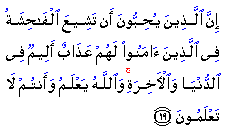Lover of Indecency, Only a Head Covering? Shahadah At Work
Issue 292 » September 17, 2004 - Shaban 2, 1425
General
| Living the Quran |
Al-Nur
(The Light)
Those who engage in fabricating and publicizing shameful allegations so that Muslim society succumbs to immoral ways and its moral structure in undermined, deserve to be punished. The words used in the verse embrace all the various forms that might be used to spread moral corruption and lewd behaviour including those means employed to awaken sexual passion, be they poetry, song, fiction, pictures, plays and drama. These also include clubs and hotels which provide dancing and other forms of obscene entertainment involving the mixed participation of men and women. The Quran declares such people to be criminals, those who deserve punishment not only in the Hereafter but also in this world. It is, therefore, the responsibility of an Islamic State to extirpate all the means which promote obscenity. The penal law of an Islamic State should declare these as cognizable offences since the Quran characterizes them as crimes against public order. In the same vein, the Quran prescribes punishments for all those who are guilty of such offences. Man might not know, but God certainly does, the adverse effects such acts have on society. Muslims should, therefore, trust God and devote all their energy and resources to putting an end to the evils which have been identified by Him. These are not minor offences which might be overlooked. Rather, they are grave and those guilty of them should be severely punished. Source: |
| Understanding the Prophet's Life |
| Only A Head Covering? To fulfil the minimum requirements of Hijab, a Muslim woman covers her entire body, except her face and hands. Once Asma, daughter of Abu Bakr, entered upon the Prophet wearing thin clothes. The Prophet turned his attention from her. He said, “O Asma, when a woman reaches the age of menstruation, it does not suit her that she displays her parts of body except this and this,” and he pointed to his face and hands. [Abu Dawud]. Proper Hijab means loose and opaque clothes. Clothes should not be alluring or similar to the clothing of men. What about guys? Islam outlines a modest dress code for men and women. The requirements are different based on the obvious physiological and psychological differences between the two genders. Hijab does not apply only to clothes. It is a state of mind, behaviour, and lifestyle. Hijab celebrates a desirable quality called Haya (modesty), a deep concern for preserving one’s dignity. Haya is a natural feeling that brings us pain at the very idea of committing a wrong. The Prophet said: "Every religion has a distinct call. For Islam it is Haya (modesty)." [Ibn Majah]. Source: |
| Blindspot |
Shahadah At Work“We are perhaps
living in times when living for Islam Why must Islam be so emphatically linked with the idea of struggle? Cannot a person be a good Muslim without involving himself or herself in a struggle requiring sacrifices? The answer is: No. And for very obvious reasons. Islam is not merely the confession of a faith which is made once in a lifetime. It requires a radical reorientation of life and thought. The confession is not merely verbal; it is an act of witnessing (Shahadah) which must transform our life into a living testimony of faith. You enter Islam by saying Shahadah (bearing witness). But you can live in Islam only by constantly doing Shahadah (Quran 2:143, 22:28). This will bring you in ceaseless confrontation with false gods inside you and outside you. Every act of sacrifice nourishes your Iman; for it transforms a verbal confession into a living reality. Therefore, it is through sacrifice that you can truly learn to love Allah, and to live and die for Him! Source: |
